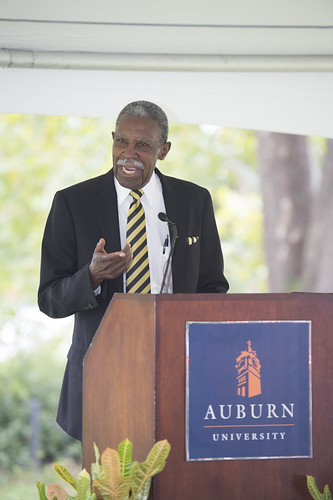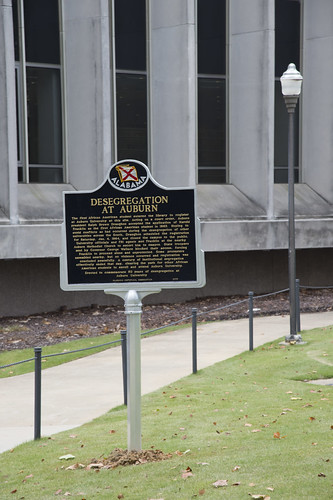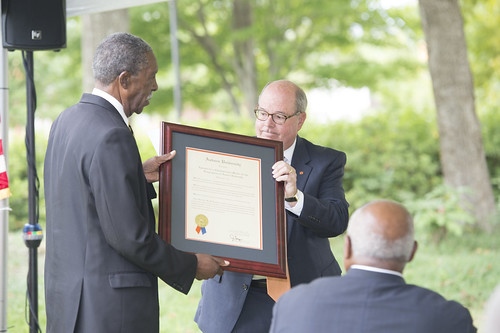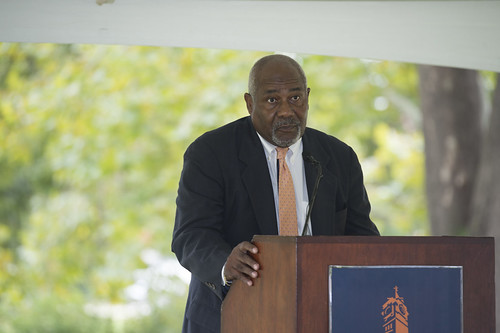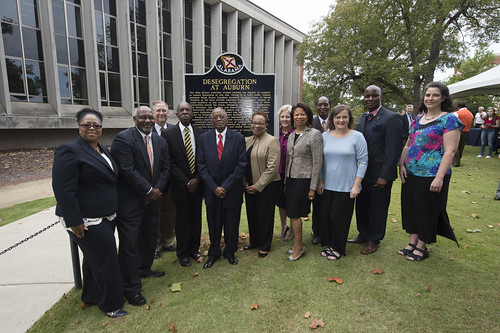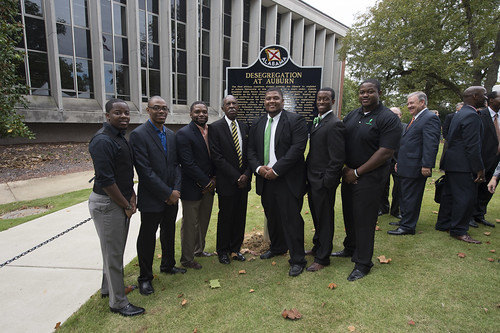Harold Franklin honored at unveiling of marker commemorating 1964 desegregation of Auburn University
Article body
Harold Franklin arrived at the library at Auburn University on Jan. 4, 1964, to register for classes in the graduate school. He was the first African American student to attend Auburn University.
A little over 50 years since the event that set Auburn on a course of becoming a more inclusive campus, Franklin was honored at a public dedication ceremony on Sept. 24 when a historical marker commemorating the 1964 desegregation of Auburn University was unveiled on the green space between the library and Mary Martin Hall.
Earlier this year, the Auburn Board of Trustees approved the installation of the marker that begins with the words, "The first African American student entered the library to register at Auburn University at this site." It goes on to state how that day came to be: "Acting on a court order, Auburn president Ralph Brown Draughon accepted the application of Harold Franklin as the first African American student in 1963." The marker provides brief details of how the day unfolded with tension but no violence, and concludes with the words, "A century of institutional segregation effectively ended that day, clearing the path for other African American students to enroll and attend Auburn University."
Thom Gossom Jr. welcomed the group gathered for the dedication and called it a great day in the history of Auburn for him and all the others who followed. Gossom, now a member of the Auburn University Foundation Board, was Auburn football's first African American walk-on in 1970 and the first African American athlete to graduate from the university.
Constance Relihan, associate provost for undergraduate studies, talked about Auburn's ongoing efforts to enhance diversity on its campuses. "Through the efforts of many members of the Auburn Family over the years, a quality college education at Auburn has become accessible to more people, and in the process, made the Auburn Family experience richer for everyone," she said.
Bob Dumas, a member of the Auburn Board of Trustees, read the board's resolution approving the installation of the commemorative marker and presented a framed copy to Franklin.
The President of Auburn's Harold Franklin Society, Sae'Breon Stiles, talked about the day belonging to "all those people, black and white, who helped to open wide the doors to this institution." The Harold Franklin Society was founded in 2008 with the goal of improving the retention, persistence and graduation rates of men of color enrolled at Auburn University.
When Franklin spoke, he thanked Auburn for recognizing what he called the "small contribution" he made to the desegregation initiative. He went on to talk about his hopes for the future for young people – that they would have a positive impact in their communities and world – and emphasized taking advantage of the education system as a way to help make that happen.
During the 2013-14 academic year, Auburn's organizing committee for "Commemorating 50 Years of Integration at Auburn University" held events recognizing not only Franklin but also others who have since helped make the university more inclusive. The dedication of the marker is a fitting finale to those events and a permanent reminder of progress made.
Related Media
Media interested in this story can contact Communications Director Preston Sparks at (334) 844-9999 or preston.sparks@auburn.edu.
Auburn University is a nationally ranked land grant institution recognized for its commitment to world-class scholarship, interdisciplinary research with an elite, top-tier Carnegie R1 classification, life-changing outreach with Carnegie’s Community Engagement designation and an undergraduate education experience second to none. Auburn is home to more than 30,000 students, and its faculty and research partners collaborate to develop and deliver meaningful scholarship, science and technology-based advancements that meet pressing regional, national and global needs. Auburn’s commitment to active student engagement, professional success and public/private partnership drives a growing reputation for outreach and extension that delivers broad economic, health and societal impact.



